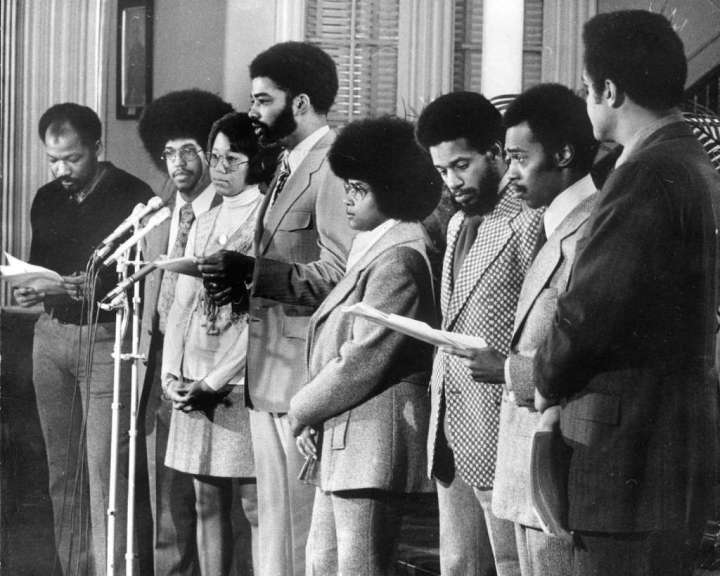“Racial Bias Charged at Washington Post,” read the headline in the New York Times on March 24, 1972. The seven Black reporters who filed an Equal Employment Opportunity Commission complaint against The Post were dubbed “the Metro Seven” because they were all assigned to the metropolitan desk.
Clifford Alexander’s fight remains unfinished

One of the reporters was Leon Dash, Pulitzer Prize winner, NABJ founder and, as we discovered after I joined The Post in 1990, a cousin from New Bedford, Mass., where my father was born. Two other complainants, LaBarbara Bowman, a reporter I first met in the early ’70s while working as a Senate staffer on D.C. matters and home-rule legislation, and Richard Prince, longtime columnist on the media and people of color, are storied figures and friends of several years standing.
But the architect of this first-ever formal class action on behalf of Post employees was their lawyer, former EEOC chairman Clifford L. Alexander Jr. The crew of young writers-turned-activists was nurtured by Alexander, and coached to stay focused on the task of bringing inclusion and diversity to a top-flight newspaper found lacking in both.
The Post’s Fourth of July obituary on Alexander, who died at his home in Manhattan at 88 on July 3, rightly lauded him as an Ivy League-educated, crusading Equal Employment Opportunity Commission chairman and first Black secretary of the Army. And The Post chronicled a few of his “first Black” milestones: Harvard University student-body president; partner at Washington’s prestigious Arnold & Porter law firm; Kennedy administration national security staffer.
But there was far more to Cliff Alexander than those marquee notices. Because of his exceptional academic preparation, motivation supplied by well-grounded family and friends, and a self-confidence borne out of having successfully competed in a racially prejudiced climate, Alexander blew through the hidden and barely visible barriers that prevented many Black men and women from climbing ladders more easily scaled by their White counterparts.
And from his work on behalf of Lyndon B. Johnson helping to steer the Voting Rights Act of 1965, and his deep dive as EEOC chair into the nasty nitty-gritty of employment discrimination in major U.S. industries, corporations and labor unions, Alexander became a preeminent American leader on busting through racial boundaries.
His name meant much to me.
In 1968, I interrupted a State Department trajectory that would have led to a promising Iron Curtain assignment because of turmoil at home — the Rev. Martin Luther King Jr.’s assassination, Robert F. Kennedy’s murder, cities in flames, a Vietnam War-torn country. I sought and obtained a detail from State to EEOC, where I hoped to serve with Alexander and his team of superb associates. It wasn’t to be. Before I arrived, Alexander resigned in the face of the Nixon administration’s opposition to his hard-charging style. I nonetheless stuck around long enough to be astounded by the scope and number of confidential conciliation agreements that EEOC negotiated with corporate America. Talk about fine upstanding companies with dirty, discriminating hands.
The news media, in Alexander’s telling, lacked clean hands, too. In a March 19, 2008, interview on NPR’s “Wisdom Watch” with Michel Martin, Alexander let loose.
He cited an EEOC hearing in which a New York Times witness applauded the paper’s great editorial positions on inclusion. “I remember saying to him at the end of the testimony, why don’t you practice what you preach? Because indeed at the New York Times, they weren’t doing a darn thing about giving Black people or Puerto Ricans in New York City an opportunity to be reporters.” That was more than 50 years ago.
His 2008 assessment: “We see in most areas of the media, and radio, and television, and the written, in particular in the newspaper world, that the inclusiveness, and I like to call it inclusiveness, not diversity, the inclusiveness is not their top priority, nor is it a place where they see how important it is for them to be able to hear views — conservative, Republican, from Latino, Asian, Black, male, female, and they don’t get it yet.”
Part of the problem, he said, “is that the media becomes quite self-serving. It talks about itself in grandiose terms but does not like the criticism of itself. And so, in order to understand why you should be inclusive, you’re going to have to understand and discuss honestly that you have a problem.”
It fell to Alexander in 1991 to put his finger on the corrosive problem that plagued Black America then, and which remains now with people of color and other aspiring marginalized groups. He told the public via a Senate panel: “You see us as less than you are. You think that we are not as smart, not as energetic, not as well suited to supervise you as you are to supervise us.”
Look around, news media. Look around, America.






